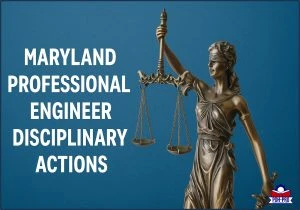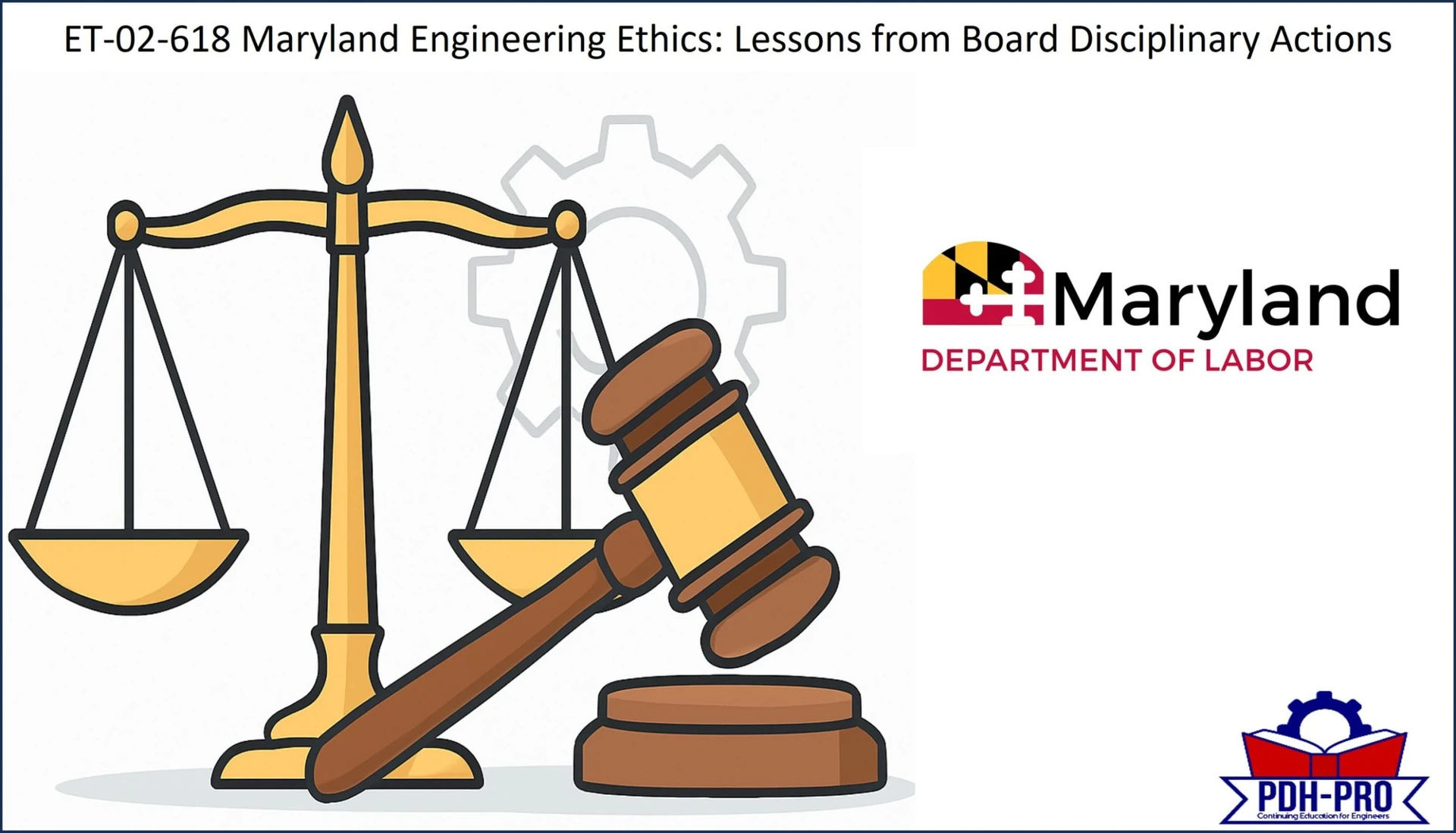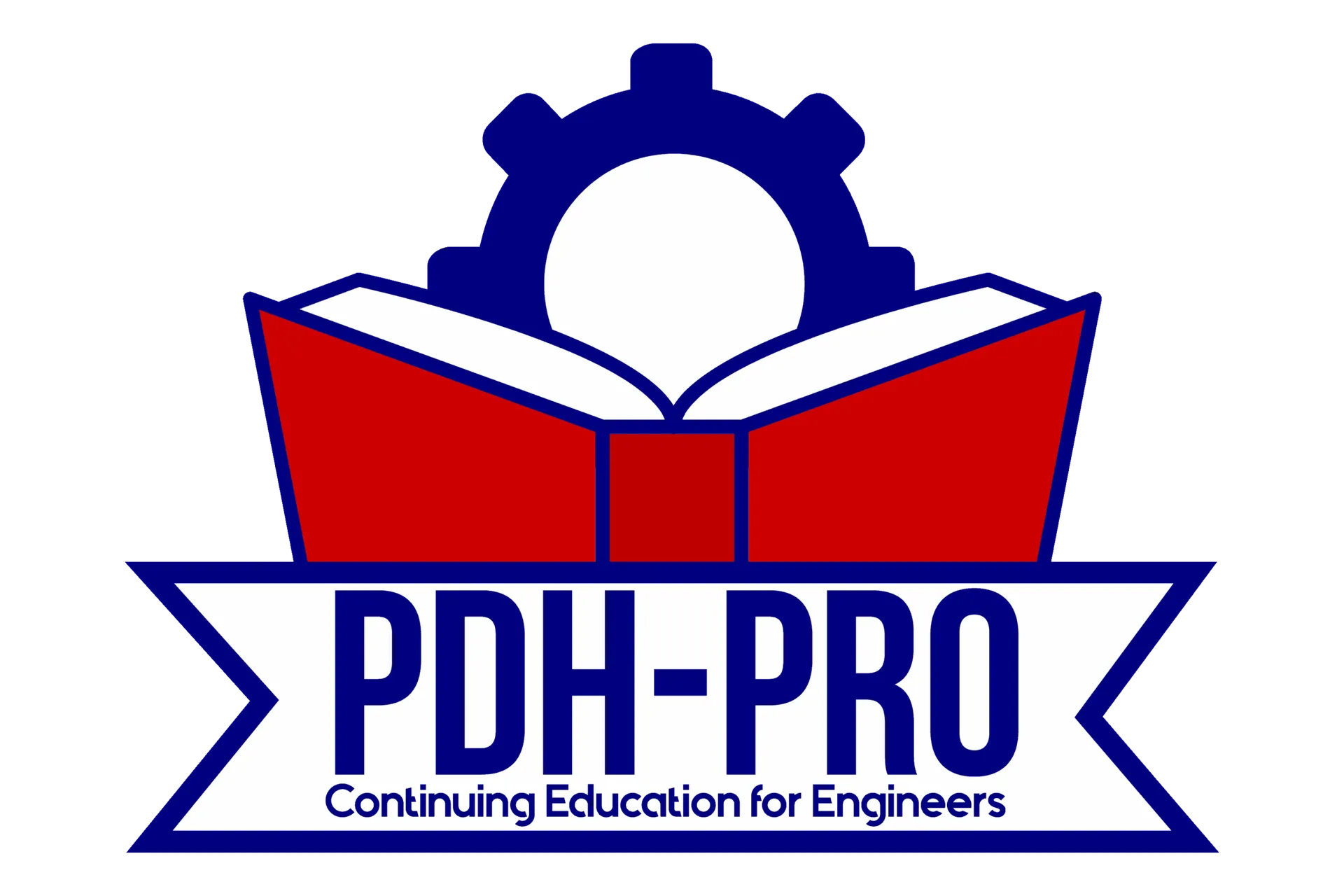
Written by: Jordan Ellis, PE
Published: July 11, 2025 | Updated: November 20, 2025
As a licensed professional engineer, I understand the importance of upholding both technical competence and ethical standards. In Maryland, engineers are held to high expectations—not just in the quality of their work, but also in how they manage their licensure, represent their credentials, and conduct themselves professionally.
This article provides a detailed look at recent disciplinary actions taken by the Maryland Board for Professional Engineers. Whether you’re a newly licensed PE or have decades of experience, reviewing real enforcement cases can serve as a practical reminder of what to avoid – and how to protect your license and reputation.
The disciplinary themes emerging in Maryland follow many of the same nationwide patterns outlined in the risk management for professional engineer disciplinary actions overview, especially regarding ethical judgment and recordkeeping obligations. Check out my article What are the Most Common Ethics Violations for Professional Engineers.
Ethics Course for Maryland Engineers

This one-hour online course helps Maryland Professional Engineers earn guaranteed PDH credit while strengthening their understanding of ethical responsibilities and state board requirements. By examining real disciplinary cases, participants will learn to identify common violations, navigate the Maryland Board’s disciplinary process, and apply practical strategies to maintain compliance and protect their professional license. Ideal for engineers committed to upholding public safety and the highest standards of integrity in Maryland.
Why Ethics and Compliance Matter for Maryland PEs
Licensed engineers in Maryland play a critical role in protecting public health, safety, and welfare. This responsibility extends beyond technical accuracy – it includes ethical decision-making and strict compliance with licensure regulations.
Even minor lapses, like failing to notify the board of a change in address or neglecting to renew your license on time, can lead to disciplinary action. More serious violations, such as practicing engineering without authorization or falsifying documents, carry even greater consequences including fines, license suspension, or public reprimand.
Maintaining ethical standards and complying with the Maryland Board’s rules is not just about avoiding penalties; it’s about preserving the integrity of the profession. As engineers, we are entrusted by the public to act responsibly, and that trust must be earned and maintained through ongoing professionalism and accountability.
Real Violations and What Happened
To better understand what leads to disciplinary action, let’s look at a few real-world examples from recent Maryland PE board cases. These cases reveal common missteps that can put your license, and professional standing, at risk.
Below is a list of recent disciplinary actions taken by the Maryland Board for Professional Engineers, including case summaries, penalties, and fines.
Table: Maryland PE Disciplinary Actions (Summary)
| Case Number | Summary of Violation | Penalty | Fine |
| 07-PE-2024 | Failed to file firm permit and improperly identified himself as a firm | Reprimand; civil penalty | $300 |
| 08-PE-2023 | Stamped documents while license was expired | Reprimand; civil penalty | $250 |
| 10-PE-2023 | Practiced engineering while firm permit was expired | Reprimand; civil penalty | $250 |
| 11-PE-2025 | Failed to respond to Board inquiry and CE audit | Reprimand; civil penalty | $500 |
| 12-PE-2023 | Practiced while license was expired; did not respond to Board | Reprimand; civil penalty | $1,000 |
| 15-PE-2023 | Sealed work performed while license expired | Reprimand; civil penalty | $250 |
| 16-PE-2022 | Engaged in engineering while not properly licensed | Reprimand; civil penalty | $250 |
| 17-PE-2023 | Practiced without proper firm registration | Reprimand; civil penalty | $250 |
| 18-PE-2023 | Practiced with expired license | Reprimand; civil penalty | $250 |
| 27-PE-2023 | Held himself out as PE while license expired | Reprimand; civil penalty | $250 |
| 31-PE-2023 | Provided engineering services while firm permit expired | Reprimand; civil penalty | $250 |
| 34-PE-2023 | Stamped drawings under expired firm permit | Reprimand; civil penalty | $250 |
| 37-PE-2023 | Practiced engineering with expired firm permit | Reprimand; civil penalty | $250 |
| 41-PE-2023 | Used engineering seal without current license | Reprimand; civil penalty | $250 |
| 43-PE-2023 | Performed work with expired license | Reprimand; civil penalty | $250 |
The failure to report disciplinary actions to other jurisdictions can lead to additional penalties, as several engineers with prior Kentucky discipline learned in these West Virginia PE disciplinary cases. Several Maryland cases share similarities with those documented in engineering ethics in Missouri disciplinary case studies, where technical errors and insufficient oversight have played prominent roles in enforcement decisions.
This action by the Louisiana Board had consequences in other states, as seen in a West Virginia disciplinary case where the engineer was fined for failing to report it.
Practicing Engineering with an Expired License
In several cases, engineers continued offering services after their license had lapsed. Even when unintentional, this is considered unlicensed practice. The typical penalties included formal reprimands and fines ranging from $500 to $1,000. In one case, a PE continued to use the title “Professional Engineer” without valid licensure, resulting in a $1,500 fine and probationary terms.
Failing to Respond to the Board
A few engineers failed to respond to board inquiries or complaints. This lack of communication was treated as a serious offense. One licensee ignored multiple board notices and was eventually issued a formal reprimand and a $1,000 fine. It’s a reminder that prompt and professional communication is essential, even during disputes.
A disciplinary action in one state must be disclosed during license renewals in others; failure to do so resulted in further sanctions in this West Virginia engineering board case.
Unlawful Seal Usage
One case involved the misuse of a professional seal on engineering documents after the engineer’s license had expired. This is viewed as a violation of public trust. The board imposed a $1,000 fine and mandated continuing education in ethics and law.
These examples underscore how seemingly small mistakes, if left unaddressed, can lead to disciplinary action. The lesson is clear: always track your license status, respond to board communications, and ensure your professional seal is used lawfully.
Broader compliance issues in Maryland are reinforced by trends discussed in the New Mexico PE disciplinary actions candid discussion, highlighting common vulnerabilities across multiple jurisdictions.
What Types of Violations Are Most Common?
Maryland’s disciplinary records show that a few key issues repeatedly lead to enforcement action. Understanding these patterns can help engineers avoid similar pitfalls.
The most frequent violation was unlicensed practice, typically involving engineers who continued to offer or perform engineering services after their license expired. This accounted for nearly half of all reviewed cases. Whether due to an oversight or misunderstanding of renewal deadlines, the consequences are serious, most commonly resulting in formal reprimands and fines ranging from $500 to $1,500.
Another common issue was failure to respond to board inquiries or notices. Ignoring official communication from the licensing board is seen as a disregard for the board’s authority and the regulatory framework of the profession. These cases often led to reprimands and monetary penalties of $500 to $1,000.
Less frequent but still notable were violations involving misuse of title or seal, false statements, and violations of probation terms. These suggest a need for greater attention to ethical obligations and legal responsibilities.
Here is a summary of violation types, frequency, and associated penalties:
| Type of Violation | Number of Cases | Typical Penalty | Fine Range |
| Unlicensed Practice | 8 | Reprimand, CE, Fine | $500 – $1,500 |
| Failure to Respond to the Board | 4 | Reprimand, Fine | $500 – $1,000 |
| Misuse of Title or Seal | 2 | Reprimand, Probation, Fine | $1,000 – $1,500 |
| False Statements or Misrepresentation | 1 | Reprimand, Fine | $500 |
| Violation of Probation Terms | 1 | Suspension, Fine | $1,500 |
By recognizing these trends, professional engineers can take proactive steps to maintain compliance and uphold their responsibilities to the public and the profession.
Penalties: More Than Just Fines
When the Maryland Board of Professional Engineers issues a disciplinary action, the consequences extend far beyond a monetary fine. While many cases do result in civil penalties—typically ranging from $500 to $1,500 – the financial impact is just one piece of the larger picture.
Public reprimands are among the most common sanctions. These are published as official board actions and become part of the engineer’s public record. Even when the underlying violation is relatively minor, the reputational damage from a published reprimand can affect future employment opportunities, client relationships, and professional standing.
In more serious cases, the board may impose probation, license suspension, or additional continuing education requirements. For example, engineers who practiced without an active license were often required to complete ethics-related CE hours in addition to paying a fine.
A few cases also involved violations of previous probation terms, which triggered stricter sanctions – including license suspension and higher fines. This demonstrates how important it is not only to comply initially but also to take corrective actions seriously if the board mandates them.
Ultimately, disciplinary penalties serve to protect the public, maintain trust in the profession, and ensure that licensees uphold the high standards expected of them. Even unintentional mistakes, like failing to renew a license or not responding to board notices, can carry meaningful consequences that affect both your career and your credibility.
How Maryland PEs Can Avoid Violations
Staying in good standing with the Maryland Board of Professional Engineers isn’t difficult, but it does require attention to detail and proactive compliance. Many of the violations listed in recent board actions were avoidable with better awareness and communication.
Here’s a practical checklist every licensed professional engineer should follow:
- Renew Your License on Time
Mark your calendar and renew before your license expires. Practicing even one day with a lapsed license can trigger disciplinary action. - Complete and Track Your Continuing Education
Maryland requires 16 PDH hours every two years. Keep records organized and ready in case of an audit. - Notify the Board of Address or Name Changes
If the board can’t reach you, you might miss critical communications—leading to automatic fines or further sanctions. - Respond Promptly to Board Correspondence
Ignoring a board letter or failing to respond to a complaint can escalate the issue, even if the original matter was minor. - Be Honest on Applications and Renewals
Disclose any out-of-state disciplinary actions or legal issues. Misrepresentation often leads to harsher penalties than the issue itself. - Review Firm Licensing Requirements
Ensure your company is properly licensed if it offers engineering services in Maryland. Practicing under an unlicensed firm is a common violation.
A little preparation goes a long way. By maintaining accurate records, renewing on time, and staying responsive, Maryland engineers can avoid unnecessary penalties and focus on what matters most – serving the public with integrity.
Final Thoughts
Staying compliant as a Maryland PE is about more than avoiding fines; it’s about maintaining the public’s trust. Most violations, like lapsed licenses or missed CE requirements, are preventable with simple diligence. Let these cases be a reminder to stay organized, informed, and proactive in meeting your professional responsibilities.
